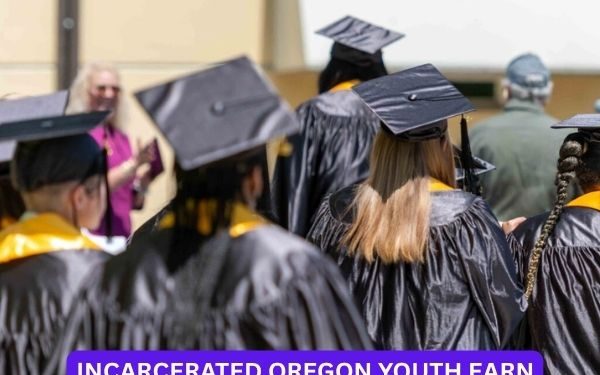In a powerful display of resilience and growth, incarcerated youth at Oregon’s Oak Creek Youth Correctional Facility in Albany celebrated their academic and vocational achievements at a recent graduation ceremony. Many received high school diplomas, GEDs, and professional certifications, while two students earned college degrees — one an associate’s and the other a master’s — from postsecondary institutions in Oregon.
When Joy Koenig became principal of Three Lakes High School and Riverside High School in 2016, the schools offered just two vocational programs. Since then, they’ve grown to include nearly 30 programs helping youth earn diplomas, certifications, and college degrees. These schools are among seven operated by the Oregon Youth Authority (OYA), which oversees about 900 youth convicted of crimes committed before age 18.
After treatment, many youths leave with expunged records and valuable credentials to support a fresh start. So far in the 2024–25 school year, youth in OYA custody have earned at least 59 high school diplomas or GEDs, six college degrees, and 206 professional licenses or certifications.
“Education is power,” Koenig said during the ceremony. “Education is money. It is the confidence booster that allows them to say ‘I have a degree,’ and when they leave they can make a living wage.”
Youth typically spend around nine months in custody, during which they can complete intensive three-month vocational programs. These programs prepare them for careers as nail technicians, hair care specialists, forklift drivers, and more.
Despite recent challenges — including the firing of OYA’s director over mishandled abuse investigations and ongoing legal scrutiny of conditions at MacLaren Youth Correctional Facility — the education programs remain a bright spot. Oak Creek, which serves girls, is adjacent to the Jackie Winters Transition Program and continues to offer crucial support. A former employee at Oak Creek is facing trial for alleged misconduct in 2021.
‘Oak Creek saved my life’: Students reflect on growth
The Oregon Youth Authority shifted to a developmental learning approach in 2014, focused on building positive environments where youth can learn both academically and emotionally. Many in custody have struggled with substance use, assault, or theft.
Seventeen-year-old Zoey shared that before Oak Creek, she cycled through custody and rehab and had no plans for the future. Now, she holds a GED and certifications in CPR, first aid, and construction — and is determined to become a tattoo artist.
“I didn’t think I would actually want to be sober for the first time since I was 13, which is crazy to me,” she said.
Eighteen-year-old K.J., also planning to become a tattoo artist, recently earned her GED and is exploring interests in photography and psychology.
“I’ve learned that I can do it and I can motivate myself and ask for help,” she said.
Jennifer Falzerano, OYA’s statewide education coordinator, emphasized the importance of connecting youth to education as a way to break the cycle of incarceration.
According to the RAND Corporation, inmates who participate in educational programs while incarcerated are 43% less likely to return to prison.
“Our kids usually don’t have those moments of feeling proud of themselves,” Falzerano said. “They’ve often struggled in public school, felt like outsiders, and never experienced real accomplishment.”
That was the case for October, 17, who battled drug addiction before entering Oak Creek. She recently became the first in her family to graduate high school.
“I’m doing really well,” she said. “Oak Creek kind of saved my life.”










